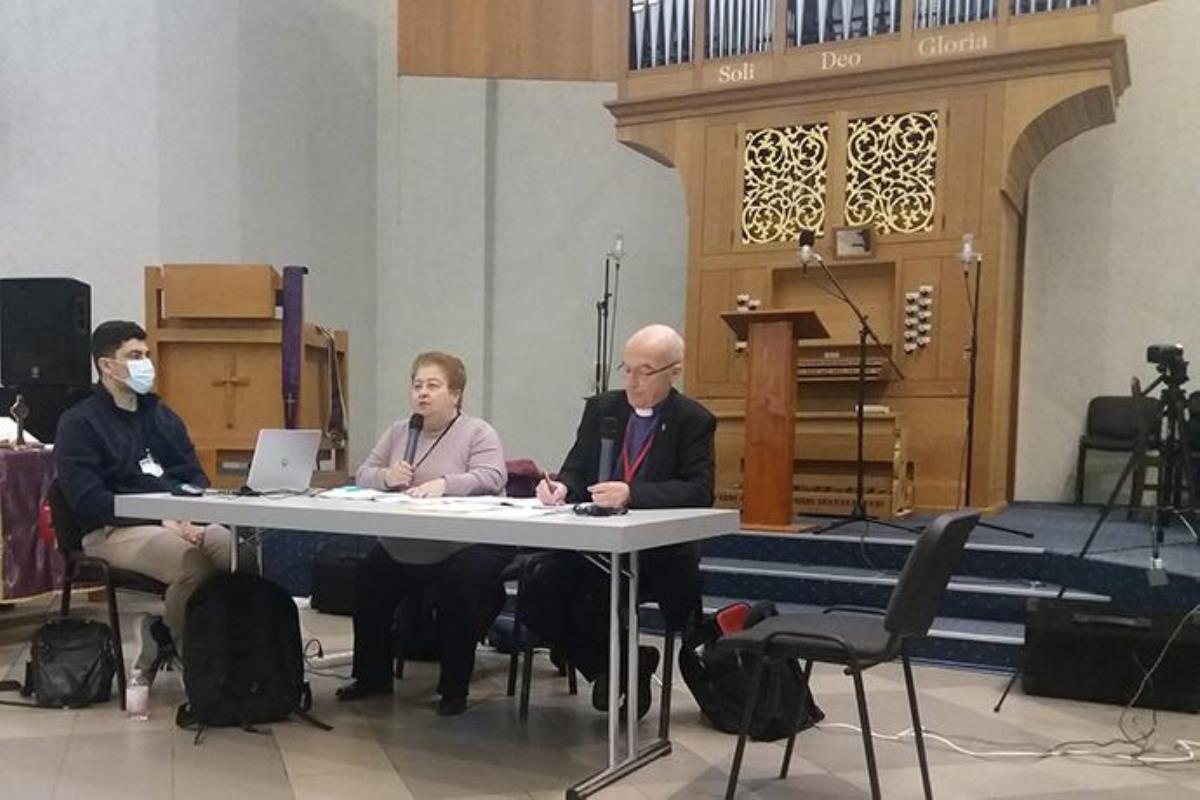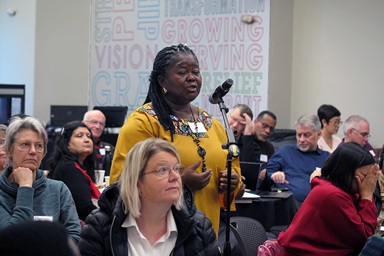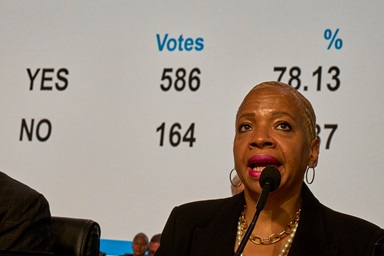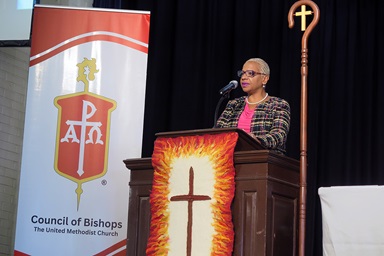
Points clés
- La Conférence provisoire de Bulgarie-Roumanie a voté pour quitter l’Église Méthodiste Unie pour rejoindre l’Église Méthodiste Mondiale, une dénomination de tendance traditionaliste qui commence ses activités le 1er mai.
- Le leader épiscopal de la Conférence, l’évêque Patrick Streiff, a jugé que la résolution de désaffiliation n’était pas conforme aux textes de l’Église et ne pouvait être votée.
- Les membres de la Conférence ont élu un autre président et ont voté à l’unanimité en faveur de la résolution de désaffiliation.
- Le président du Transitional Leadership Council de l’Église Méthodiste Mondiale a déclaré que la Bulgarie-Roumanie sera accueillie en tant que conférence annuelle.
La Conférence annuelle provisoire de Bulgarie-Roumanie a voté pour quitter l’Église Méthodiste Unie et rejoindre l’Église Méthodiste Mondiale lorsque cette nouvelle dénomination de tendance traditionaliste commencera ses activités le 1er mai.
Malgré l’objection de leur évêque, les membres de la Conférence de Bulgarie-Roumanie ont approuvé à l’unanimité une résolution de désaffiliation le 1er avril, lors de la session annuelle de la Conférence, qui s’est tenue à Varna, en Bulgarie.
La résolution parle de « la crise actuelle de l’Église Méthodiste Unie » et décrit l’Église Méthodiste Mondiale comme une Église qui « soutient l’autorité des Saintes Écritures et cherche à vivre dans l’obéissance aux commandements du Seigneur, tels que nous les comprenons. »
L’Évêque Patrick Streiff, de la Conférence Centrale d’Europe centrale et méridionale, supervise la Conférence de Bulgarie-Roumanie. Dans une déclaration datée du 7 avril, il a déclaré que le vote de sortie avait été pris « sans fondement juridique dans le Livre de Discipline (de l’Église Méthodiste Unie). »
Bien que les évêques président les sessions de la Conférence annuelle, Streiff a déclaré que les membres l’avaient contourné en élisant un pasteur pour présider le vote de désaffiliation.
Streiff a déclaré que les Méthodistes Unis roumains ont indiqué plus tard, par l’intermédiaire de leur surintendant, qu’ils travailleraient avec lui en vue d’un « accord respectueux et pacifique pour quitter l’Église dans le courant de cette année. »
Mais Streiff a déclaré que le nouveau surintendant des Méthodistes Unis bulgares, le Révérend Krasimir Madzharov, prévoyait d’appliquer la résolution de désaffiliation, ce qui signifierait rejoindre l’Église Méthodiste Mondiale le 1er mai.
« Je regrette profondément que l’Église de Bulgarie n’ait pas voulu suivre les dispositions pour quitter l’Église Méthodiste Unie et ait décidé de couper tout lien avec la Conférence Centrale d’Europe centrale et méridionale, » a déclaré Streiff. « Avec l’Église Méthodiste Unie en Roumanie, je continuerai à œuvrer pour une manière mutuellement respectueuse de quitter l’Église Méthodiste Unie. »
Madzharov a décliné une demande d’interview, arguant que les Méthodistes Unis bulgares souhaitaient s’en tenir à un communiqué de presse qu’ils avaient publié, donnant leur compte rendu de la réunion. Le Révérend Rares Calugar, Surintendant des Méthodistes Unis en Roumanie, n’était pas joignable dans l’immédiat.
En réponse aux questions de United Methodist News sur la possibilité de contester la décision des Bulgares, Streiff a déclaré que tout ce qu’il pouvait dire pour l’instant, c’est qu’une décision de droit qu’il a prise au cours de la session sera soumise au Haut Conseil judiciaire pour examen — et qu’il avait sollicité un examen accéléré.
Le Haut Conseil judiciaire — la plus haute instance judiciaire de l’Église Méthodiste Unie — pourrait décider que Streiff ait raison et que la désaffiliation ait été faite de manière inappropriée. Mais le fort désir des membres de partir est clairement exprimé dans la résolution de désaffiliation, qui demande de modifier les articles d’incorporation, de conserver les propriétés et de passer rapidement sous l’égide de l’Église Méthodiste Mondiale.
David W. Scott, qui supervise le blog UM & Global, a écrit dans une publication datée du 8 avril que : « La Conférence Centrale d’Europe centrale et méridionale pourrait avoir peu de recours pour s’opposer à la décision et peu d’incitation à combattre une décision unanime de la conférence annuelle. »
La Bulgarie compte un peu moins de 1 200 Méthodistes Unis répartis dans 30 églises, avec 18 pasteurs en activité, selon le site Web de la Conférence Centrale d’Europe centrale et méridionale. Le site Web indique que l’Église Méthodiste Unie de Roumanie compte 30 membres, trois pasteurs et trois églises.
Bien que la Conférence de Bulgarie-Roumanie soit petite, sa décision de se désaffilier peut être considérée comme un signe avant-coureur, étant donné l’incertitude et le tumulte auxquels est confrontée l’Église Méthodiste Unie, qui compte 13 millions de membres.
Pendant des décennies, la dénomination a connu des divisions internes sur la théologie et l’interprétation biblique, notamment sur l’acceptation des personnes LGBTQ. Bien que les interdictions de la dénomination concernant le mariage homosexuel et l’ordination des « homosexuels pratiquants déclarés » soient maintenues, l’opposition à ces interdictions, en particulier aux États-Unis, s’est intensifiée.
La proposition du Protocole de Réconciliation et de Grâce par la Séparation — dévoilée début 2020 par un groupe diversifié de responsables d’églises — permettrait aux églises Méthodistes Unies de tendance traditionaliste de partir avec leurs biens et de former une nouvelle dénomination. Les Conférences Méthodistes Unies pourraient également partir pour la nouvelle dénomination, dans les conditions prévues par le plan. Et la nouvelle dénomination recevrait 25 millions de dollars pour commencer.
Mais la Conférence Générale de 2020, au cours de laquelle le protocole devait être examiné, a été reportée trois fois, en raison de la pandémie. La prochaine Assemblée législative de l’Église Méthodiste Unie n’est pas prévue avant 2024.
Entre-temps, les Méthodistes Unis de tendance traditionaliste ont annoncé qu’ils allaient lancer l’Église Méthodiste Mondiale le 1er mai. Avec le report de la Conférence Générale et l’examen du protocole, le rythme des désaffiliations d’églises locales s’est accéléré, tout comme les discussions sur le départ des conférences.
Le Conseil des évêques a demandé au Haut Conseil judiciaire, la plus haute instance judiciaire de la dénomination, des questions relatives au processus de désaffiliation des conférences américaines.
La résolution de la Conférence de Bulgarie-Roumanie indique que cette Conférence ne se retire pas en vertu du paragraphe 572 du Livre de Discipline de l’Église Méthodiste Unie, qui explique comment une conférence annuelle en Europe, en Afrique et aux Philippines peut devenir « une Église Méthodiste autonome, une Église Méthodiste autonome affiliée ou une Église Unie affiliée. »
Dans leur communiqué de presse, les membres de la conférence de Bulgarie-Roumanie ont déclaré que le paragraphe 33 du Livre de Discipline (établissant la conférence annuelle comme l’organe de base de l’Église) et la décision 1366 du Haut Conseil judiciaire avaient établi un droit fondamental pour une conférence de voter la séparation.
« Il est vrai que la Conférence Générale n’a pas défini les procédures et les conditions d’exercice d’un tel vote, mais cela ne peut être une raison pour que la Conférence annuelle ne profite pas de cette possibilité, » indique le communiqué de presse.
Dans sa déclaration, Streiff a affirmé avoir dit aux membres de la Conférence que la désaffiliation qu’ils demandaient ne pouvait se faire qu’en vertu du paragraphe 572, qui prévoit un processus long et en plusieurs étapes, dont l’approbation par la Conférence Générale.
Streiff a déclaré que lorsque les membres ont contesté sa décision, il avait expliqué que « la question qui se pose à nous devient une question de droit que je soumettrai au Haut Conseil judiciaire » — et qu’aucun vote sur la résolution ne pouvait avoir lieu avant que cette cour ne se prononce.
Cependant, Streiff a déclaré que « les membres ont ensuite poursuivi la réunion sans que je la préside, » choisissant le Révérend Daniel Topalski, ancien surintendant de l’Église Méthodiste Unie de Bulgarie, pour la présider.
Le communiqué de presse du groupe de désaffiliation confirme essentiellement le récit de Streiff, en disant que les membres ont approuvé à l’unanimité une motion de suspension des règles et ont ensuite choisi Topalski comme président temporaire.
Topalski est le président du chapitre régional d’Europe de l’Est de la Wesleyan Covenant Association, qui a conçu la planification de la nouvelle dénomination.
Bien que Streiff ait déclaré que les Bulgares et les Roumains avaient maintenant un calendrier différent pour la désaffiliation, l’Église Méthodiste Mondiale recevra la Conférence de Bulgarie-Roumanie le 1er mai, a déclaré le Révérend Keith Boyette. Il préside le Transitional Leadership Council de l’Église Méthodiste Mondiale et est président de la Wesleyan Covenant Association.
« Sauf indication contraire, une fois que les églises et le clergé auront affirmé leur engagement envers le Livre transitoire des doctrines et de la discipline de l’Église Méthodiste Mondiale, les églises de la conférence annuelle seront reconnues comme des congrégations membres et les pasteurs de la conférence annuelle seront reçus comme pasteurs ordonnés, diacres ordonnés et personnes se préparant à l’ordination, » a déclaré Boyette.
Il a ajouté que « la Conférence annuelle de Bulgarie-Roumanie sera parmi les premières conférences annuelles à rejoindre l’Église Méthodiste Mondiale, » mais il n’a pas nommé d’autres conférences.
La Roumanie partage ses frontières avec l’Ukraine, et les Méthodistes Unis roumains sont très impliqués dans l’aide aux réfugiés depuis l’invasion russe de l’Ukraine.
Hodges est un rédacteur de United Methodist News basé à Dallas. Contact Médias : [email protected]



